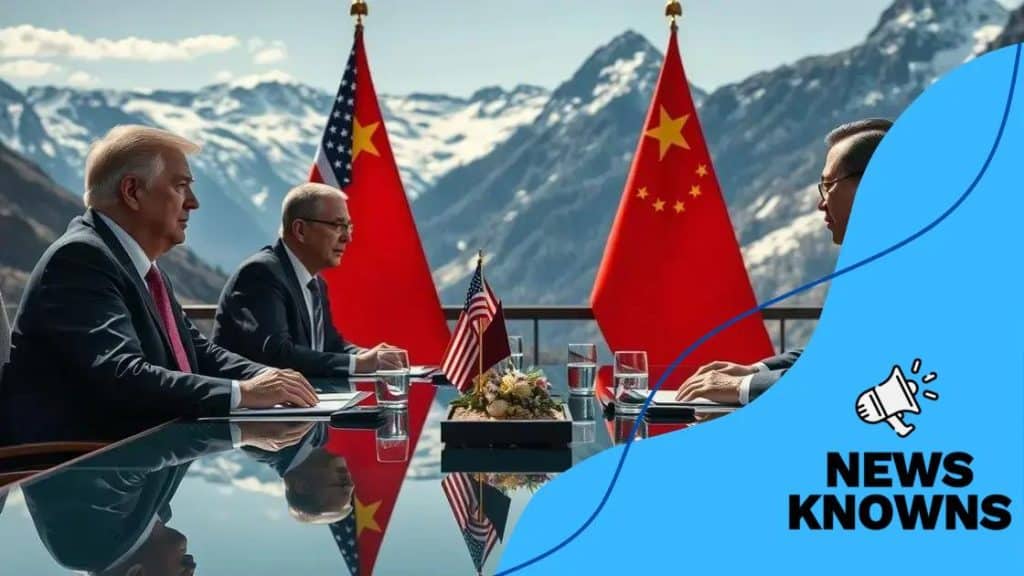US-China trade talks Switzerland: what to expect

Anúncios
US-China trade talks in Switzerland aim to reduce tariffs, improve bilateral trade relations, and address intellectual property concerns, with significant implications for global markets and supply chains.
US-China trade talks Switzerland are poised to grab headlines and stir discussions about future economic relations. But what exactly can we anticipate from these negotiations?
Anúncios
Overview of the current US-China trade relationship
The current US-China trade relationship reflects a complex situation influenced by tariffs, supply chain issues, and economic strategies. As the world’s largest economies, both countries play critical roles in global trade. Understanding this relationship is essential for anticipating future developments.
Key Factors Influencing Trade
Several factors shape the trade dynamics between the US and China:
- Tariffs: Imposed tariffs affect the cost of imports and exports, leading to price changes in consumer goods.
- Supply Chains: Many US companies rely on Chinese manufacturers, making supply chain stability crucial.
- Intellectual Property: Concerns over intellectual property theft have heightened tensions.
As discussions continue, it’s important to note how these elements interplay. Trade policies could shift not only bilateral relationships but also impact global markets. With both nations negotiating terms, observers are closely watching any potential easing of restrictions.
Anúncios
Recent Developments
In recent months, statements from officials in both countries hint at willingness to re-engage. While challenges remain, this re-engagement could pave the way for new agreements. Notably, sectors like technology and agriculture are focal points in discussions.
Moreover, understanding the role of the global economy provides context. Trade with China impacts American businesses by creating jobs, yet domestic industries also seek protections to maintain competitiveness. Balancing these interests remains a daunting task for lawmakers.
In summary, the US-China trade relationship is under constant evaluation, with each country weighing the benefits and drawbacks of cooperation versus competition. Future negotiations may influence not just their economies but also the broader global landscape.
Key issues on the table during the talks
During the recent trade talks between the US and China, several key issues emerged that could significantly impact their economic relationship. Understanding these issues is crucial for grasping the potential outcomes of the negotiations.
Tariffs and Trade Barriers
One of the most prominent topics revolves around tariffs. The US has imposed tariffs on various Chinese goods, which has led to retaliatory measures by China. These tariffs affect the prices consumers see and can stifle trade flows.
- Proposed reductions in tariffs may encourage increased trade.
- Negotiations aim to resolve outstanding disputes around tariffs.
- Both nations seek to protect their domestic industries while fostering trade.
Another significant aspect of the talks includes addressing trade barriers. These barriers can include import quotas or regulatory standards that challenge market access.
Intellectual Property Rights
Concerns over intellectual property (IP) rights have been a longstanding issue. The US claims that Chinese practices often lead to the theft of American technology and ideas. This concern remains high on the agenda during the discussions.
Certain measures to protect IP could lead to enhanced business cooperation. Both sides might explore ways to create stronger protections to encourage innovation.
Supply Chain Resilience
The talks also focus on building a more resilient supply chain. The COVID-19 pandemic highlighted vulnerabilities in global supply chains, prompting both nations to reconsider their strategies. Ensuring reliability in the movement of goods has become essential for economic stability.
Discussions may include diversifying supplier bases and reducing dependencies. Additionally, fostering local industries can play a role in mitigating risks associated with global disruptions.
Each of these issues is interconnected and vital to the overall negotiations. As the US and China navigate through these discussions, the outcomes may reshape not only their bilateral relations but also influence global economic trends in the years to come.
Reactions from global markets and analysts

The discussions surrounding the US-China trade talks have sparked varied reactions from global markets and analysts. As these negotiations unfold, many stakeholders closely monitor potential impacts on investment and economic stability.
Market Responses
In response to news from the trade talks, stock markets have shown fluctuations. Increased optimism typically leads to spikes in market performance, while uncertainty can result in declines.
- Improved sentiment may boost tech and manufacturing stocks.
- Market volatility often arises with new announcements.
- Investors tend to react quickly to any perceived progress or setbacks in negotiations.
These responses indicate how interconnected global markets are, as traders watch for signals that could influence their investment strategies. Analysts believe that swift reactions to news can drive short-term volatility but may not always reflect long-term trends.
Analyst Opinions
Experts express diverse opinions on the outcomes of the trade talks. Some analysts predict positive developments, citing potential for stronger cooperation. On the other hand, pessimistic views emphasize challenges that remain unresolved.
Key considerations for analysts include:
- The potential for a trade deal to enhance economic growth.
- The likelihood of continued tensions affecting sectors like technology.
- Global supply chains’ adaptation to changing trade policies.
Interestingly, while some sectors may benefit, others could face setbacks based on how the negotiations unfold. Consumer goods, agriculture, and manufacturing sectors often find themselves directly impacted by the outcomes of these discussions. As global markets respond, decision-makers must weigh both risk and opportunity.
Overall, the reactions from global markets and analysts highlight the intricate relationship between trade policies and economic performance. Understanding these dynamics can provide insights into how future negotiations may reshape economic landscapes worldwide.
Potential outcomes of the Switzerland discussions
The potential outcomes of the Switzerland discussions between the US and China could have significant implications for global trade and diplomacy. As these two powerful nations engage in talks, the results may shape future agreements and alter the economic landscape.
Trade Agreements
One immediate expectation is the possibility of new trade agreements. If both sides reach a consensus, it could lead to reduced tariffs and improved trade relations. Such agreements might include:
- Lowering of existing tariffs on key goods.
- Facilitating easier cross-border trade for businesses.
- Strengthening supply chain collaboration.
These changes could create a more favorable environment for trade, benefiting both economies and encouraging global partners to align with these new terms.
Market Confidence
Another outcome these discussions may impact is market confidence. Positive developments can lead to a boost in investments as businesses gain clarity on future regulations. Increased investor confidence often results in growth in stock markets and can assist companies in planning for expansion.
However, uncertainty or negative outcomes may lead to market volatility. Investors will be watching closely for signs of progress or setbacks in negotiations, as these can influence economic forecasts.
Impact on Global Partnerships
The discussions in Switzerland may also affect global partnerships. Other nations will likely respond to the outcomes, adjusting their trade policies based on the agreements made. For instance, countries that trade heavily with either the US or China could experience shifts in their economic strategies.
Moreover, international organizations might see a need to revise their roles in global trade as a response to any new agreements. This evolving landscape could lead to a reevaluation of existing trade agreements and foster new alliances.
Overall, the potential outcomes of the Switzerland discussions have a wide-ranging impact that extends beyond the US and China. Understanding these possibilities can help businesses and countries prepare for the future.
Long-term implications for international trade
The long-term implications for international trade resulting from the US-China trade talks in Switzerland could reshape global commerce significantly. As these economic giants discuss their future trade policies, the effects will ripple across various sectors worldwide.
Shifts in Global Supply Chains
One major implication could be the reconfiguration of global supply chains. Companies may seek to diversify their manufacturing bases to reduce dependency on any single country. This transition could lead to increased production in other regions such as Southeast Asia or Mexico.
- Firms might invest more in technology to enhance output.
- New trade partnerships may emerge as companies adjust.
- Potential tariffs could influence where goods are sourced.
This diversification could enhance supply chain resilience but might also lead to increased production costs in the short term.
Regulatory Changes
As trade policies evolve, regulatory changes are likely to follow. Changing tariffs, trade agreements, and export-import regulations can create uncertainties for businesses. Companies will need to stay adaptable to navigate these changes effectively.
With new regulations, compliance costs could rise, affecting profit margins. Businesses that can pivot quickly to meet regulatory demands will stand to benefit. However, those slow to adapt may face challenges.
Impact on Consumer Goods
Consumer goods markets may see notable shifts in availability and pricing based on trade negotiations. If tariffs are reduced, consumers could enjoy lower prices for imported products. Conversely, if tensions escalate, consumers may face higher prices due to increased tariffs.
Furthermore, brands may choose to localize production to mitigate risks associated with international shipping. This move may lead to changes in the types of products available and affect consumer choices.
Overall, the long-term implications of these trade talks will extend far beyond the immediate effects. They will influence how countries negotiate future agreements and how businesses operate globally. Understanding these developments is crucial for stakeholders in international trade.
FAQ – Frequently Asked Questions about US-China Trade Talks
What are the main goals of the US-China trade talks?
The main goals include reducing tariffs, improving trade relations, and addressing intellectual property concerns.
How might these talks affect global markets?
Positive outcomes could boost market confidence and increase investments, while uncertainty may lead to market volatility.
What potential changes could impact consumers?
Consumers may experience fluctuations in prices and product availability based on the outcomes of trade agreements.
How can businesses prepare for potential changes from these talks?
Businesses should stay informed about developments, assess their supply chains, and be ready to adapt to new regulations.





